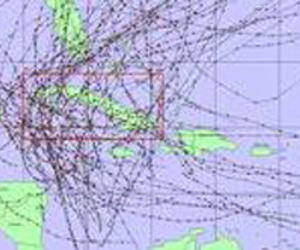Hurricane season starting with high US, Caribbean risk
- Submitted by: manso
- Society
- 06 / 02 / 2011

By Staff Writers. Miami (AFP) May 31, 2011. The Atlantic hurricane season kicks off Wednesday with elevated threats to the United States and nations around the Caribbean, the latest forecasts show.
The season officially begins June 1 and runs to November 30, and will feature atmospheric conditions which experts predict will lead to formation of 12 to 18 named tropical storms, of which six to 10 could become hurricanes, according to the US National Oceanic and Atmospheric Administration.
NOAA predicts between three and six major hurricanes of Category 3 intensity or higher on the five-level Saffir-Simpson hurricane wind scale.
Skies were generally calm across the Atlantic on Tuesday, and NOAA and other meteorological websites predicted no drama in the opening days of the season. The peak Atlantic storm period is August to early October.
This season is predicted to surpass the historical average of 11 tropical storms -- which have winds between 39 and 73 miles (63 to 117 kilometers) per hour -- and six hurricanes, including two major Category 3 hurricanes with sustained winds of 111 miles (178 km) per hour or greater, according to NOAA.
Along the southeastern United States, which counted itself lucky in 2010 with no major hurricanes making landfall, some 37 million people -- living in coastal areas between the Gulf state of Texas and North Carolina, halfway up the US East Coast -- are at risk from powerful hurricanes.
According to an April study by experts at Colorado State University, chances of a major hurricane pounding US shores this year stand at 72 percent, well above the average of 52 percent.
There is also a 61-percent chance that a major hurricane makes landfall in the Caribbean, according to the experts.
With a total of 12 hurricanes, the 2010 season left hundreds dead in floods and mudslides in Central America and the Caribbean, where they destroyed homes and infrastructure and devastated crops.
Among the worst of the year was Hurricane Tomas, a late-season cyclone that churned over the eastern Caribbean island of St. Lucia before battering Haiti and drenching Costa Rica. At least 57 people were killed.
The season was particularly ruthless in Central America, which experienced its worst rainy season in half a century, with floods and mudslides that killed over 300 people, mainly in Honduras, Guatemala and El Salvador.
The first tropical storm of the 2011 season will be named Arlene, according to US authorities, who use an A-to-Z system for naming storms.
earlier related report
Havana frets over hurricane season
Havana (AFP) May 31, 2011 - Cuban meteorologists expressed worry on the eve of Wednesday's start to hurricane season that a major cyclone this year could strike Havana, which has not suffered a direct hit in more than six decades.
"This is a concern that weatherman have here," television meteorologist Armando Caymares said Tuesday, referring to the so-called "return period" in which a certain category of hurricane can be expected to hit a given location.
Experts say the return period for a major Category 4 hurricane slamming into Havana is 50 years, meaning a potentially devastating hurricane hit on the city of 2.2 million people is about 17 years overdue.
"The measures to reduce vulnerabilities should be put into practice immediately," Jose Rubiera, director of forecasting for Cuban meteorological institute INSMET, told the Communist Party newspaper Granma.
He named the cleaning of drains and roofs, tree pruning, and the checking of power lines as top priorities.
The capital has been bruised by several tropical storms and hurricanes in recent years, notably Hurricanes Dennis and Wilma in the extraordinarily active 2005 season. Dennis and Wilma -- both major hurricanes -- caused substantial damages in Cuba but they grazed Havana at low intensity on the five-level Saffir-Simpson hurricane scale.
According to statistics from Cuban meteorological institute INSMET, the last Category 4 hurricane, with winds up to 249 kilometers (155 miles) per hour, to directly hit Havana did so in 1944.
INSMET specialists predict a "normal" June 1 through November 30 season, while the US National Oceanic and Atmospheric Administration says the Atlantic will experience a rougher-than-normal 2011 season, with up to 10 hurricanes.
Yet Cuban experts have warned that a normal season is still fraught with dangers.
In late 2007, meteorologists predicted an average season for 2008. By April 2008 they changed their prediction to above average, and by season's end Cuba had been slammed by three major hurricanes that caused billions of dollars in damage.
Source: www.terradaily.com/reports/Hurricane_season_starting_with_high_US_Caribb...
Comments